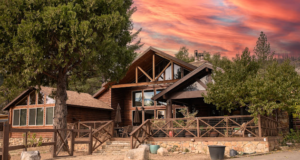MADERA COUNTY – The filing of two lawsuits by the Picayune Rancheria of Chukchansi Indians may cost a lot more than lawyer’s fees and court costs. It may mean the loss of upwards of $20 million in payments if and when the North Fork Mono Tribe builds their casino.
When the governor signed the compact between the State of California and the North Fork Rancheria of Mono Indians, it was stipulated that the Mono Tribe would pay the Picayune Rancheria of Chukchansi Indians a percentage of revenues from their gaming through 2020. This was intended to mitigate the impact of the Mono Tribe’s casino, projected to be built just north of Madera along Highway 99, on the Chukchansi casino, located some 39 miles away, just south of Coarsegold on Highway 41.
However, the compact also established that those payments would not be forthcoming, and the obligation of the Mono Tribe and the State to pay the Chukchansi would be terminated if “the Chukchansi Indian Tribe pursues in any way, or finances, in whole or in part, directly or indirectly, any lobbying, administrative, legal, judicial or other challenge to the Secretary’s decision to accept the 305-Acre Parcel in trust for the [Mono] Tribe, the California Legislature’s ratification of this Compact, or the Secretary’s approval of this Compact.”
On Nov. 30, 2012, the Picayune Rancheria of Chukchansi Indians filed a lawsuit in California Superior Court in Sacramento against Governor Brown, the California Department of Transportation, the California Department of Fish and Game, The County of Madera, the City of Madera, NP Fresno Land Acquisitions (owners of the 305-acre parcel to be put in trust for the North Fork Rancheria of Mono Indians) and 50 “Does,” persons as yet unidentified, but alleged to be “responsible in some manner for the damages alleged in this Petition.”
On Aug. 31, 2012, Governor Jerry Brown officially concurred with the U.S. Department of the Interior’s decision to allow 305 acres of land near Madera to be put into trust for the North Fork Rancheria of Mono Indians for the purpose of establishing a class III gaming facility.
Governor Brown, in his communication with Kenneth L. Salazar, Secretary of the Interior, cited the thorough 7-year process in establishing the Mono’s historical connection to the land, the benefit to the Mono tribe, its citizens and the surrounding communities, the benefit to other tribes through the Revenue Sharing Trust Fund and the Tribal Nation Grant Fund, and the payments to the Chukchansi tribe to mitigate any impact on their casino, as some of his reasons for agreeing with the decision.
The Chukchansi lawsuit, however, alleges that the governor failed to comply with the California Environmental Quality Act (CEQA) when he issued his official concurrence approving the proposal by the North Fork Rancheria to develop what is described in the petition as “a massive off-reservation casino and hotel resort complex.”
The suit seeks a writ of mandate and injunctive relief, requiring the governor to rescind his concurrence for the land use, and for city, county and state agencies to stop all action in support of the project until the governor “properly complies with CEQA.”
The lawsuit contends that the Governor issued his decision without first formally reviewing and considering the potential environmental impacts of the project, without preparing an environmental study, as required by CEQA, without providing state and local agencies and the general public an opportunity to participate in the CEQA environmental review process, and without ensuring that all steps would be taken to minimize the potential environmental impacts of the casino/hotel.
The lawsuit further alleges that the Chukchansi will “suffer irreparable harm from which there is no adequate remedy at law” if the North Fork Tribe is authorized to construct and operate its proposed casino without adequate CEQA environmental review, and that several members of the Picayune Tribe have homes within the vicinity of the site of the proposed casino, and therefore they have a strong interest in maintaining a quality environment in Madera County.
Another challenge to the Mono Tribe’s casino was filed in District Court in Washington, D.C., on Dec. 19, 2012, this one by the Madera Ministerial Association and Stand Up For California!, naming as defendants the United States of America, United States Department of the Interior, Kenneth Lee Salazar (Secretary of Dept. of Interior), and Kevin K. Washburn (Asst. Secretary-Indian Affairs, Dept. of Interior)..
The lawsuit contends, among other things, that the federal government can only take lands into trust for tribes that were federally recognized before June 18, 1934, and that the North Fork Rancheria does not meet that criteria. Therefore, the suit claims, the Secretary has no authority to acquire land in trust on behalf of the tribe.
Though this lawsuit was not filed by the Chukchansi, it does enumerate damages which the plaintiffs claim will be suffered by the Picayune Rancheria as a result of what they call a “mega-casino.”
Among the damages alleged is the loss of revenues at the Chukchansi Gold Resort and Casino, which will then result in the loss of 500 jobs currently held by members of the Chukchansi tribe. The suit also alleges that the Chukchansi will then be unable to make per capita payments to its citizens, will be forced to reduce or eliminate a number of existing government programs funded by the tribe for its citizens, and will have to decrease financial support for community programs.
The Picayune Rancheria then took their fight to federal court. On Dec. 31, 2012, the Chukchansi filed another lawsuit, this one in District Court in Washington, D.C. naming as defendants the United States of America, United States Department of the Interior, Kenneth Lee Salazar (Secretary of Dept. of Interior), and Kevin K. Washburn (Asst. Secretary-Indian Affairs, Dept. of Interior).
The suit seeks to prevent the U.S. Government from taking into trust the 305-acre parcel for the North Fork Rancheria of Mono Indians, and overturn the decision to allow the Mono to develop their casino.
The lawsuit contends that the Department of the Interior’s decision to take this off-reservation land into trust and allow gaming on the land violates the Administrative Procedure Act, the Indian Gaming Regulatory Act, and the Indian Reorganization Act, and that these “illegal” actions will have a devastating economic impact on the Picayune Tribe.
It is alleged that the building of the Mono casino would cause the Picayune Tribe to suffer job losses and significantly reduced profits, due to the close proximity of the proposed Mono casino to the population centers from which they draw business. Members would then suffer irreparable harm when their tribal government, forced to operate on smaller revenues, would have to reduce benefits essential to the health, safety, and welfare of tribal members.
The Chukchansi petition contends, as does the Stand Up California! lawsuit, that Governor Brown failed to follow state law when he failed to prepare or consider an environment study, and invite public participation in the process before concurring with the federal government’s decision to take the Madera site into trust for the purposes of gaming.
The lawsuit also disputes the supposition that the Mono have any historic, modern or legal connection to the land.
This latest round of lawsuits will certainly delay any forward movement for the North Fork Rancheria, who had planned to break ground early in 2013.
Charles Banks-Altekruse, owner of CA Consulting, and Communications Team member for the North Fork Mono Rancheria, is disappointed, but not surprised.
“Any time you have any kind of development, you’re going to have some special interests who, as a last resort, are going to file lawsuits,” says Altekruse. “Our feeling is that they do a disservice because it’s going to delay thousands of jobs and hundreds of millions of dollars coming into the community. And it’s not a very good message for tribes. They should be more supportive of each other.”
Altekruse says that though this will cause yet another delay, the tribe will work through it, but that there is no way to judge how long the legal process will take.



